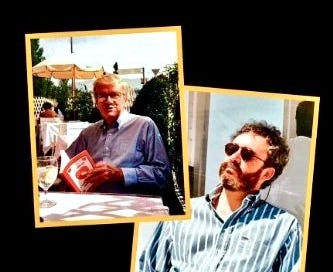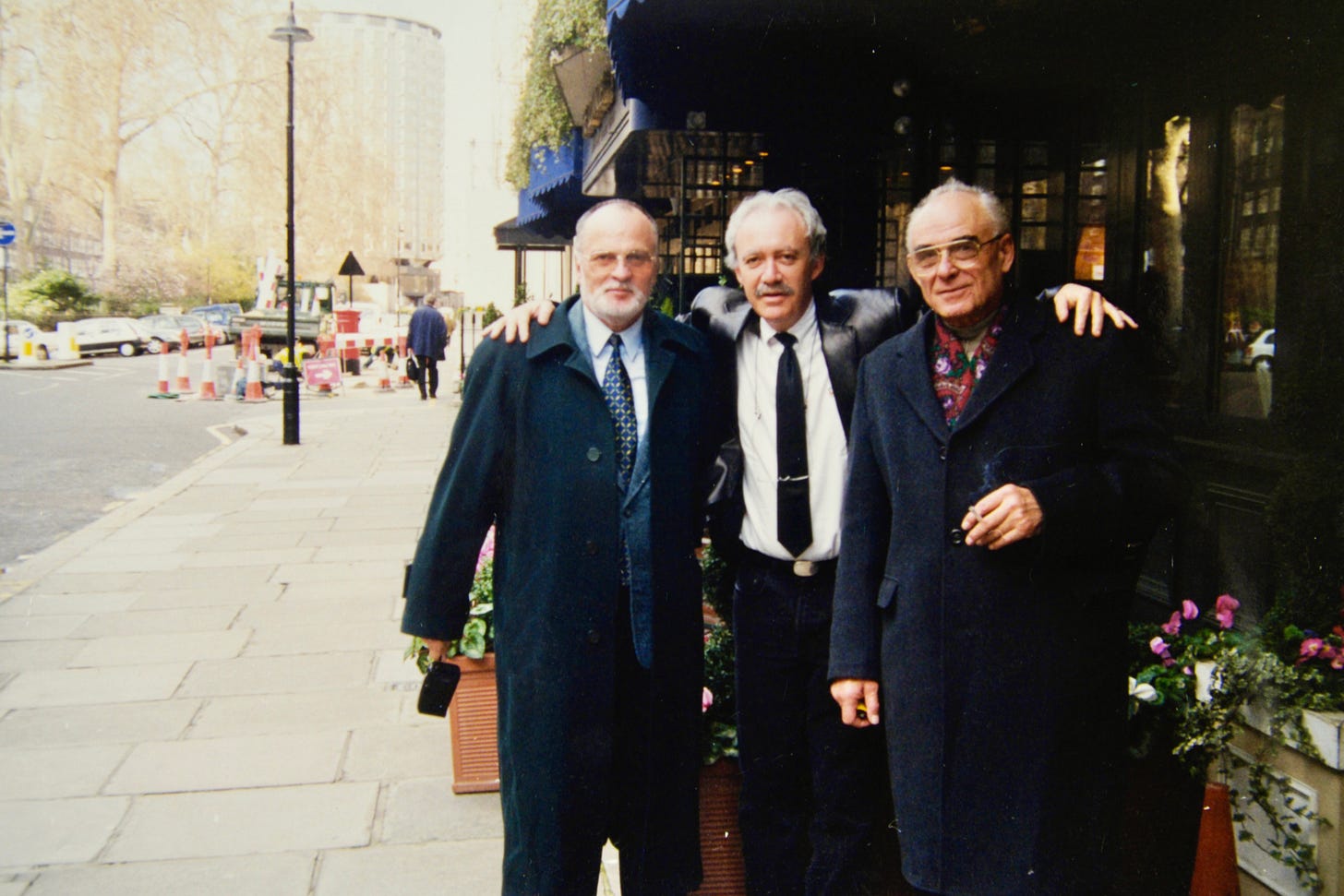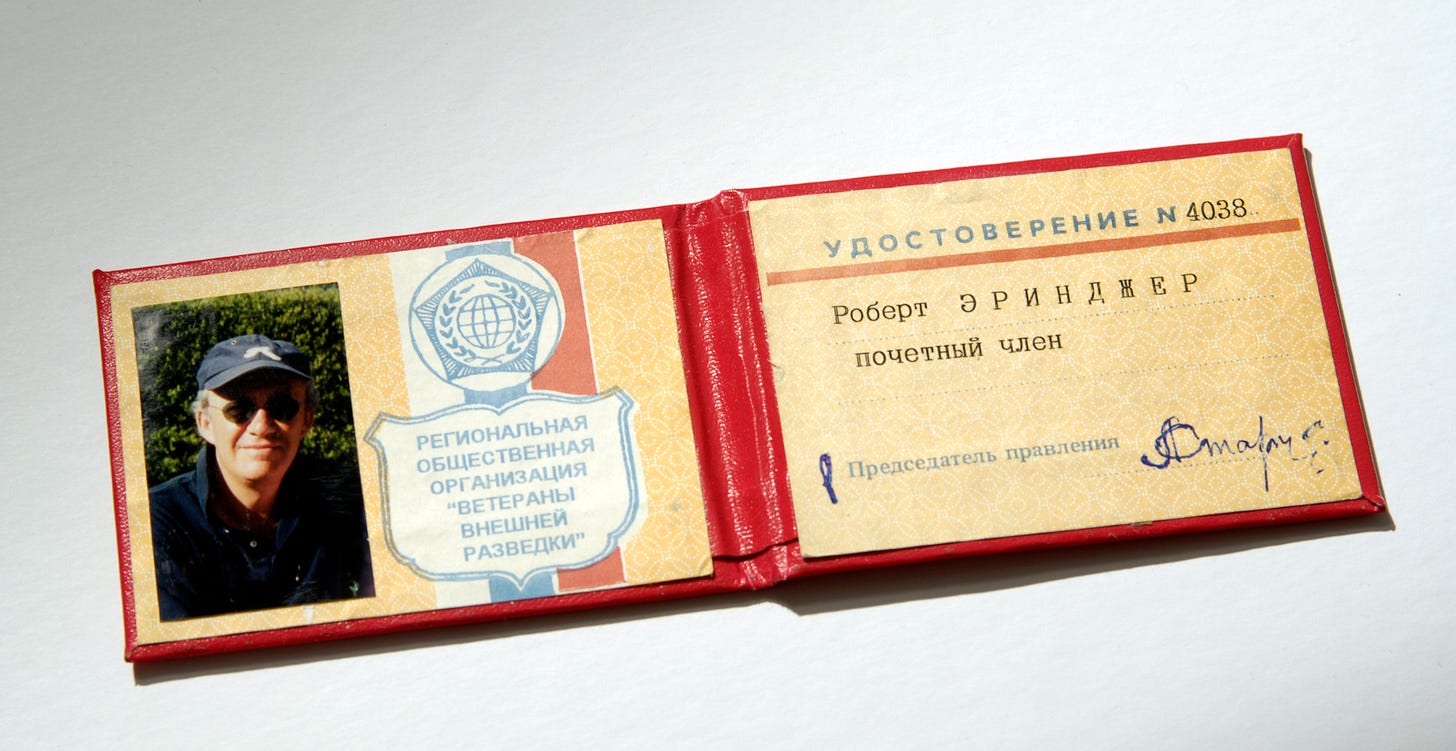December 1999
I set off to Europe, solo, cloaked in Brioni and armed with a LaGuiole corkscrew—as a weapon more versatile than a dagger yet capable of uncorking a bottle of Margeaux.
Not only was I still engaged in undercover assignments for the FBI (this trip included), I had contracted my services (with the Bureau’s blessing) to another intelligence service (introduction courtesy of Clair George).
This would be my most important trip to date: my old beat, multiple new missions.
My driver slyly cut around Thanksgiving Sunday bumper-to-bumper traffic by detouring through the long-term car park, dropping me at Arrivals. This had the added benefit of confusing any possible surveillants.
I did not think I was being watched yet, but I knew surveillance would cut in sooner or later. Behind me, I’d had left a trail of spies—Cuban and Russian—who had been probing my legend by accessing public records about me and conducting cursory inspections of my various accommodation addresses. (Tripped wires had kept me informed.)
I boarded a Swissair Airbus 330 and took my seat in first-class with its eiderdown comforter and feather pillows.
I hadn’t planned to eat, just sleep, but the service was so efficient and cuisine so good, I tucked into caviar and smoked salmon and full-bodied Bordeaux. With Xanax cutting in, I slid into a solid four-hour slumber before gliding into Zurich at 8:35 a.m.
Not twenty minutes later, I belted myself into another aircraft destined for Geneva—an earlier flight than the one posted on my ticket. Not only did it save time, it would also complicate matters for anyone expecting me on the later flight.
I hopped the Alps to the tune of the High Llamas Cold and Bouncy, my rallying cry for sub rosa assignments, which aptly described the flight.
Geneva was as gloomy and austere as its Calvinist founders. In contrast, the Beau Rivage welcomed me with warmth. A message was waiting from CIA traitor Edward Lee Howard, who was in Geneva to meet me.
Clair once told me, “Defectors almost never adjust.” Such was the case with Howard. Even after many years in Russia, he was terribly homesick and wanted nothing more than to return to the United States. Truth was, he had come to hate Russia and Russians.
I had become Howard’s new best friend since we’d met six years earlier.
But, as revealed earlier, our friendship was an illusion—one I had conceived, crafted and executed for the FBI, a book ruse—like the one I invented for Countess Bossi, and others; what I came to refer to as my Book Model.
Surveillance cut in soon after Howard showed up at the Beau Rivage for the first of several meetings with me over the next few days.
This would be the last time I would see Howard. He came to an untimely end two-and-half-years later: A mysterious “accident” near Moscow. I have always believed he was murdered by Russian intelligence, partly as a result of his relationship with me.
I left Howard near the Mont Blanc Bridge before he embarked on some Christmas shopping. I had a plane to catch, another adventure.
Checking in for my 3:05 flight to Nice, I noticed Air France ran a 2 p.m. flight and snagged it, again disrupting the plans of any would-be watchers expecting to pick me up in Nice.
Maybe 90 seconds elapsed between stepping off the plane and climbing into a taxi. “Monaco,” I instructed. “Hotel de Paris.”
A phone message awaited me: My next appointment.
I’m not permitted to write about this particular assignment as it remains subject to a government nondisclosure agreement. Suffice to say, it was a mission of strategic importance to national security.
Next day: A new adventure. Morning cappuccino at my favorite Monte Carlo coffee bar with Mike Powers, one of Prince Albert’s closest friends. A month earlier, Mike had asked me to investigate a Monaco resident who was trying to strong-arm him out of a sporting project in the principality.
Now, at this meeting, I conveyed our findings, the significance of which transcended my friend’s immediate concern.
“Prince Albert should know about him,” I said, not least because this individual had skillfully inserted himself into the prince’s social orbit.
Calls were made, a late dinner scheduled: Pizzeria St. Michel in Cap d’Ail, 10:30.
A poetic choice. Since first visiting Monaco 18 years earlier, I had passed this little pizzeria hundreds of times. Each time, I had said to whoever was in the car (or to myself), I must stop there for a pizza one day.
Before our rendezvous, I strolled through Monaco, winding up at Stars & Bars, a trendy American-style sports bar where, over a glass of Bandol wine, I contemplated my life. I did not need to dress for work, had not knotted a tie around my neck this trip. I did not spend my working days in fluorescent shoeboxes and conference rooms. My meetings did not go on for hours. I did not write long reports. As Clair George put it, “the best intelligence is a scrap of paper in your back pocket.”
In my back pocket I carried a bombshell for the Hereditary Prince of Monaco.
Moono, the IRS sting artist, once told me that an undercover agent has lots of blank spaces, free time. The work itself—if you can call it that—is about total focus and role-playing, but only for short, intensive periods.
I arrived at the pizzeria first.
Clair George: Always arrive early—and recon the rendezvous site.
The proprietor had reserved a table near the door. I requested one furthest away, without mentioning I expected Prince Albert to join me.
The place was rustic, decorated with antique farming equipment.
Mike Powers arrived; we ordered wine. And then Prince Albert strode in. His two bodyguards took the table near the door.
I gifted the prince with a reproduction vintage baseball hat, Kelly green with an A (for Albert) embroidered on it (insignia for the old Brooklyn Athletics).
We ordered pizza and Mike explained why he had organized this meeting at such short notice. And then it was my turn. I conducted an oral briefing.
The prince was shocked.
After we finished eating, I handed him the crumpled report to read. (And then, as Clair would have done, carefully retrieved it.)
“The more immediate problem is our friend having to terminate the relationship. If the target of this report values his existence in Monaco, a few words from you, Albert, would solve the problem.” I paused. “The larger problem is this bad guy’s continued existence in Monaco. Like a cancerous tumor, he will grow and become more intimidating. It’s just a matter of time before they start pulling hits in Western Europe.”
(Twenty-four hours later, Edmund Safra, a banker, would be dead from asphyxiation—a fire in his Monaco penthouse that to this day remains controversial.)
The prince looked at me. “May I ask you something?”
“Of course.”
”If I give you the name of a Russian, could you find out about him for me?”
“Of course.”
The prince borrowed my pen, the Hemingway Mont Blanc ball pen I’d carried all decade, and scribbled Alexei Fedorichev, Fedcominvest. “He wants to buy into our football team.”
The prince offered to drive me back to Monaco. Outside the pizzeria, still and quiet at this late hour, he donned his new baseball cap. We climbed into the backseat of his bodyguards’ car and they drove us the quarter-mile to where Albert had parked his BMW. From there he zipped through Monte Carlo’s dark streets and pulled into the forecourt at Hotel de Paris.
The doorman, about to open my door, froze when he glimpsed the prince, and waited, unwilling to interrupt our conversation.
When I awakened next morning, this was my first thought: I’m working for Prince Albert of Monaco!
Two months later I returned to Monaco to report my findings to the Hereditary Prince, a 5 p.m. meeting at the Palace. I sat in the austere anteroom—so quiet you could hear its grandfather clock tick-tock—until summoned.
The prince apologized for keeping me waiting.
“I know your schedule is unrelenting,” I said. “As for me,” I deadpanned, “I’ve survived three assassination attempts between Washington and here.”
“Really?” The prince’s eyes popped.
“Just kidding.”
“But it wouldn’t surprise me,” said the prince.
“Not after what I discovered about that name you gave me…”
“Fedorichev?”
“Read this,” I produced a single sheet from my back pocket, the same way Clair would have done. (Over time, I adopted his mannerisms.)
The prince read, mouth agog. What he learned excluded the Russian from buying into Monaco’s football team (At that time, anyway—another story.)
“It seems to me,” I said, “that Fedorichev and the person I briefed you on in December are just a small part of what’s going on in Monaco. There are others like them here, and more Russians waiting in the wings. This may be Monaco’s greatest danger in the years ahead. The Red Mafia. The best posture will be preventive action. Stop them from getting here.”
The prince concurred with my assessment.
I told him the next step, if he were interested, would be for me to provide an overview of how the Russian intelligence services and the Red Mafia perceived Monaco.
The prince asked me to put a proposal in writing.
Next day to London, a new adventure: I hosted two former KGB officers—part of my undercover assignment for the FBI.
At the conclusion of their visit, they bestowed upon me “honorary” membership in the retired KGB officers association.







Hello Mr. Eringer, now that is an interesting Russian Document "Chief of the Veteran Foreign Intelligence Services" seems your "Story" is getting more and more interesting by the Document.
Howard Walther, member of a Military Family